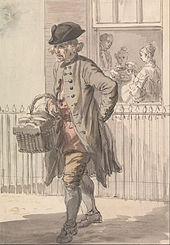Do You Know Thw Muffin Man Without Words
"The Muffin Man" is a traditional nursery rhyme, children'southward song, or children's game of English origin. Information technology has a Roud Folk Vocal Index number of 7922.
The man in question, who lived on Drury Lane in London, may have been a man whose profession was delivering baked appurtenances such every bit English muffins or it may have been an impoverished beggar man (like a ragamuffin).
Lyrics [edit]
The most widely known lyrics are as follows:
Do [or "Oh, do"] you know the muffin man,
The muffin man, the muffin man.
Do you know the muffin man,
Who lives on Drury Lane?Yes [or "Oh, yes"], I know the muffin man,
The muffin homo, the muffin homo,
Yes, I know the muffin homo,
Who lives on Drury Lane.[1]
Origins and significant [edit]
The rhyme was first recorded in a British manuscript circa 1820, that is preserved in the Bodleian Library with lyrics very like to those used today:
Practise y'all know the muffin homo?
The muffin man, the muffin homo.
Do you know the muffin homo
Who lives in Drury Lane?[1]

Sheet music for Harry King's setting of the song (1889)
Victorian households had many of their fresh foods delivered, such as muffins, which were delivered door-to-door by a vendor known every bit a muffin homo. The "muffin" in question was the bread item known as an English muffin, non the typically sweeter U.South. diversity of muffin.[two] Drury Lane is a thoroughfare bordering Covent Garden in London.
The rhyme and game appear to have spread to other countries in the mid-nineteenth century, particularly the United states of america and kingdom of the netherlands. As with many traditional songs, there are regional variations in wording; for case, another pop English language version substitutes "Dorset Lane" for Drury Lane,[ane] while in the Dutch version (entitled Zeg ken jij de mosselman ), mussels are substituted for muffins, and Scheveningen, the fishermans harbour nigh the Hague, for Drury Lane.[iii]
In Volume 5 of his gimmicky account of the London Prize Ring, Boxiana, published in 1829, Pierce Egan writes of an attempted prepare (or "cross") of a lucifer scheduled for October xviii, 1825, between Reuben Marten and Jonathan Bissel ("Young Gas"). Young Gas refused to have the ransom and one calendar week later identified the person who offered him £200 to throw the fight as a "Mr. Smith, a muffin-baker in Gray's Inn Lane." Young Gas likewise identified the "gentlemen" who employed the muffin-baker to act equally go between, but those gentlemen denied involvement claiming they did not take "the slightest knowledge of the muffin-homo."
Game [edit]
Iona and Peter Opie observed that, although the rhyme had remained fairly consistent, the game associated with it has inverse at to the lowest degree three times including: every bit a forfeit game, a guessing game, and a dancing ring.[ane]

In The Young Lady's Book (1888), Matilda Anne Mackarness described the game as:
The start role player turns to the one side by side her, [sic] and to some sing-vocal tune exclaims:
- "Do you lot know the muffin man? The muffin man, the muffin man.
- Practise y'all know the muffin human who lives in Drury Lane?"
The person addressed replies to the same tune:
- "Yep, I know the muffin man. The muffin homo, the muffin man.
- Oh, yes, I know the muffin man, who lives in Drury Lane."
Upon this they both exclaim:
- "Then two of us know the muffin human being, the muffin human being,".
No. ii and so turns to No. three, repeating the same words, who replies in the same way, only maxim, "3 of united states of america know the muffin man,". No. 3 then turns to No. 4, and so on round the room, the same question and respond existence repeated, the chorus only varied past the addition of 1 more number each time.[iv]
Verses beyond those described in the book have been sung. For example, the vocal may be concluded, "We all know the Muffin Man ..."
Notes [edit]
- ^ a b c d I. Opie and P. Opie, The Singing Game (Oxford: Oxford Academy Press, 1985), pp. 379–82.
- ^ K. F. Kiple, and K. C. Ornelas, The Cambridge World History of Food (Cambridge: Cambridge Academy Press, 2000), p. 1224.
- ^ van Zantwijk, Bert (24 July 2016). "Zeg ken jij de Mosselman". Wordpress. Retrieved 25 May 2018.
- ^ Matilda Anne Mackarness The Young Lady'south Book: A Manual of Amusements, Exercises, Studies, and Pursuits. (London: George Routledge and Sons, 1888), pp. 278–280.
Source: https://en.wikipedia.org/wiki/The_Muffin_Man
Post a Comment for "Do You Know Thw Muffin Man Without Words"